To ensure a short charging time to have your EV road-ready in the morning, you should own the right EV charger. A 230V single-phase EV charger in Australia featuring a power rate of 3.6kW up to 9.6kW will easily do the job. Before buying one of them, you should read up on the best brands and electric car charger costs. In this article, we give you a reference for some of the best EV charger brands available in Australia, their costs, as well as introduce you to EV charger incentives that might save you some money.
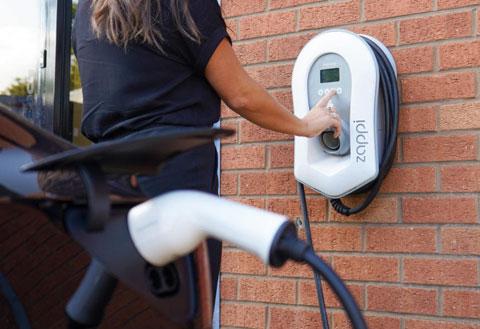
How Much Will You Spend When Installing Your Home EV Charger?
When upgrading your home for EV charging, you should look at each cost involved.
EV Charger Cost
Single-phase EV chargers are the most popular option, not because they are slightly cheaper, but because most Australian homes have a single-phase electrical connection and upgrading to a three-phase is quite expensive. Single-phase Level 2 electric car charger costs go from $750 up to $1750, depending on the functionality of the model (discussed below). These are your stock standard home chargers that most people and car brands talk about.
If you have a three-phase connection at home, then three-phase EV chargers are the best option. Not only are they more powerful, but they also have similar electric vehicle charger costs compared to single-phase EV chargers. The only limitation is that your home needs to have a three-phase electrical connection. The cost for three-phase Level 2 EV chargers goes from $750 up to $2,000.
Installation Costs
Another important aspect is the cost charged by a certified electrician to complete the installation. If your home was designed considering future upgrades and you only require installing the charger, the cost is close to $750-$900 for a single phase installation. Learn more about revcharge’s pricing.
If you need an upgrade on your switchboard, electrical wiring, or another part of the electrical infrastructure of your home, this may increase the overall cost, so the cost can extend to up to $2000 for an installation, but this is not too common.
Can You Reduce the Cost of a Home EV Charger?
Australia is looking to achieve the Zero Emissions Vehicles (ZEV) roadmap. And so, they are providing subsidies for EV drivers that are mainly for the purchasing of EVs, but some of them include rebates and interest-free loans to upgrade your homes and install an EV charger.
Currently, there are two types of incentives for EV charger installations:
- The Sustainable Household Scheme in the Australian Capital Territory
- The Electric Vehicle Charger Grants Scheme in the Northern Territory.
Unfortunately, there are no such similar incentives for Australia’s largest regions, NSW and Victoria.
How Much Do The Best EV Charger Brands Cost in Australia?
To get the best value out for your money, we recommend picking an EV charger manufactured by the best brands available in Australia. In this section, we introduce each of them and discuss the features and specs included in their EV chargers.
Ocular:
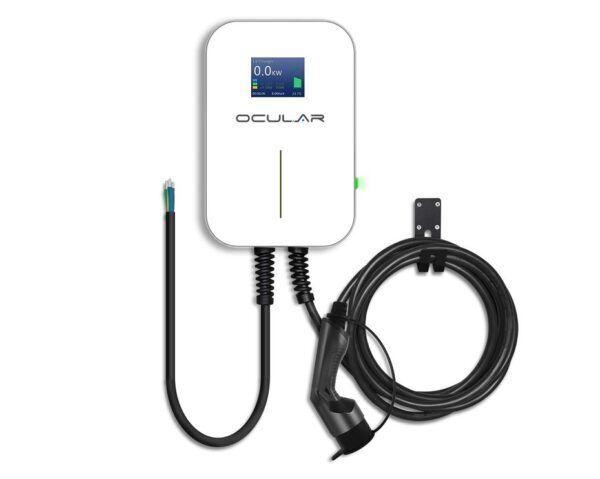
Ocular is a locally owned and founded EV charger company. This company manufactures the Ocular LTE, a high-quality EV charger specially designed to suit the needs of Australian EV drivers.
The Ocular LTE is a simple plug-and-charge EV charger rated for indoor and outdoor usage. This EV charger will draw power directly from a single power source, but you can use a distribution board to energise it with power from a battery storage system, a PV system, or the grid. The only issue here is that it’s not ‘Solar Smart’, meaning that you are not able to control the power input of solar or battery energy like you would with other brands (more below).
A 7.2 kW single-phase version of this electric car charger costs $899 for the untethered version and $980 for the tethered version. The 22 kW tethered three-phase variation costs $1,100 and the three-phase untethered option costs $1,200. Tethered means the charger comes with a cable to connect to your car, while untethered means it comes with no charging cable. We generally recommend untethered options so that you can take your charging cable with you on the road.
Wallbox:
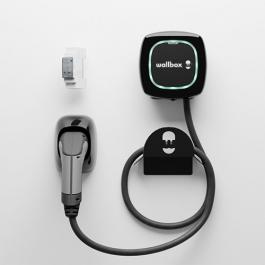
Wallbox was founded in 2015 in Barcelona. Currently, the company has offices in 9 countries and sells chargers in over 80 countries. EV chargers manufactured by Wallbox are focused on including a smart design, a simple user interface, and an aesthetically pleasing design with practical features. They are also one of the smallest chargers on the market, so they don’t look bulky on your garage wall!
The Wallbox Pulsar Plus is one of the best EV chargers manufactured by this brand. All adjustments and monitoring can be managed using the app via Bluetooth or using internet over Wi-Fi or Ethernet. The charger comes with a 5 to 7 metres tethered cable and features Power Sharing functionality. Power Sharing means that your charger can share its power with other chargers.
Wallbox manufactures a single-phase 7.2kW version of the EV charger costing $1,550 and a 22kW three-phase variation costing $1,650. Smart Solar EV charging can be implemented, but it requires additional components that cost $231 for the single-phase version and $374 for the three-phase version.
Tesla:
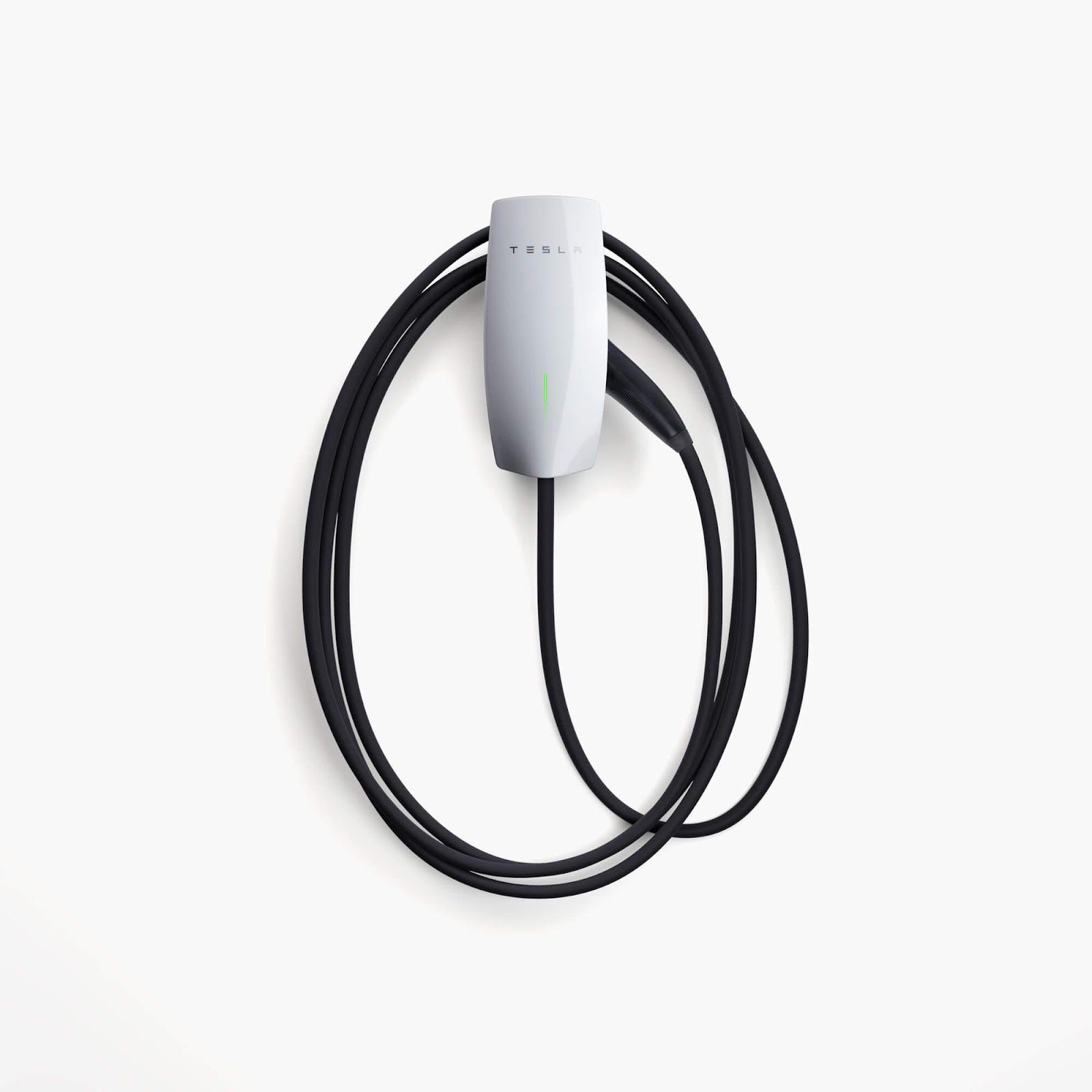
Tesla is an EV brand that does not need any introduction! This company manufactures the Tesla Model 3 and the Tesla Powerwall – both excellent EV and battery solutions used by many Aussies. For home EV chargers, Tesla also manufactures the Tesla Gen 3, one of the best chargers in the market.
The best of the Tesla Gen 3 lies in its simplicity. This EV charger features Power Sharing capability, complete management and monitoring via the app, and a versatile design to be installed on a single-phase or a three-phase electrical connection.
While the Tesla Gen 3 does not feature Smart Solar charging, you can store solar energy during the day with a Powerwall and charge the EV with solar power when the charger is working. The power rate for the Tesla Gen 3 can be adjusted up to 22kW, meaning the charger is both single and three phase capable. The Tesla home EV charger costs $780. This is one of the cheapest three phase power chargers on the market.
Zappi:
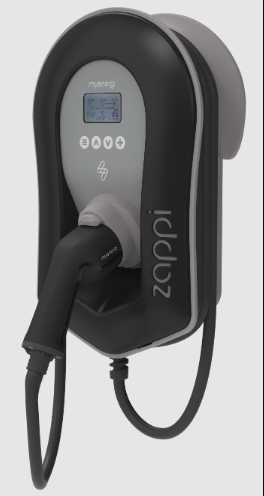
Founded in the UK, MyEnergi created the Zappi EV charger, one of the best and most capable EV chargers designed to work with solar and wind power. The company places a heavy focus on sustainability and ecological solutions, looking to create a positive impact on the environment.
The Zappi EV charger is rated for indoor and outdoor use; it also comes with a fully integrated Smart Solar charging function requiring the use of CT clamps (electrical devices installed with the charger by an electrician to monitor energy flow). This EV charger can operate with power from the grid, power stored at home batteries, or a mixed input.
The Zappi EV charger costs $1,345 for the 7.2kW single-phase untethered version and $1,395 for the tethered version. A three-phase 22kW version can be bought for $1,645 for the untethered variant and $1,695 for the tethered one.
Originally, the charger cannot be controlled via the app, but you can add the MyHub for an additional cost of $175 and connect the charger to the internet, to control it via the app. This allows you to see live energy flow from your power sources (i.e. grid, solar etc), and you can also start and disconnect the charger remotely.